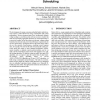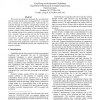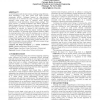PLDI
2003
ACM
15 years 18 days ago
2003
ACM
This paper presents the design and implementation of a compiler algorithm that effectively optimizes programs for energy usage using dynamic voltage scaling (DVS). The algorithm ...
CASES
2003
ACM
15 years 18 days ago
2003
ACM
The development of energy-conscious embedded and/or mobile systems exposes a trade-off between energy consumption and system performance. Recent microprocessors have incorporated ...
102
click to vote
DATE
2003
IEEE
15 years 19 days ago
2003
IEEE
We present an integrated approach that provides fault tolerance and dynamic power management for a real-time task executing in an embedded system. Fault tolerance is achieved thro...
LCPC
2004
Springer
15 years 21 days ago
2004
Springer
Techniques to reduce power dissipation for embedded systems have recently come into sharp focus in the technology development. Among these techniques, dynamic voltage scaling (DVS)...
ISLPED
2004
ACM
15 years 23 days ago
2004
ACM
As clock frequency and die area increase, achieving energy efficiency, while distributing a low skew, global clock signal becomes increasingly difficult. Challenges imposed by dee...
ISLPED
2004
ACM
15 years 23 days ago
2004
ACM
Traditionally, dynamic voltage scaling (DVS) techniques have focused on minimizing the processorenergy consumption as opposed to the entire system energy consumption. The slowdown...
EMSOFT
2005
Springer
15 years 26 days ago
2005
Springer
We present AutoDVS, a dynamic voltage scaling (DVS) system for hand-held computers. Unlike extant DVS systems, AutoDVS distinguishes common, course-grain, program behavior and cou...
ISLPED
2005
ACM
15 years 27 days ago
2005
ACM
Concerns about the reliability of real-time embedded systems that employ dynamic voltage scaling has recently been highlighted [1,2,3], focusing on transient-fault-tolerance techn...
RTSS
2005
IEEE
15 years 28 days ago
2005
IEEE
Abstract— Dynamic voltage scaling (DVS) is a promising technique for battery-powered systems to conserve energy consumption. Most existing DVS algorithms assume information about...
RTAS
2005
IEEE
15 years 28 days ago
2005
IEEE
We present an on-line Dynamic Voltage Scaling (DVS) algorithm for preemptive fixed-priority real-time systems called low power Limited Demand Analysis with Transition overhead (l...




